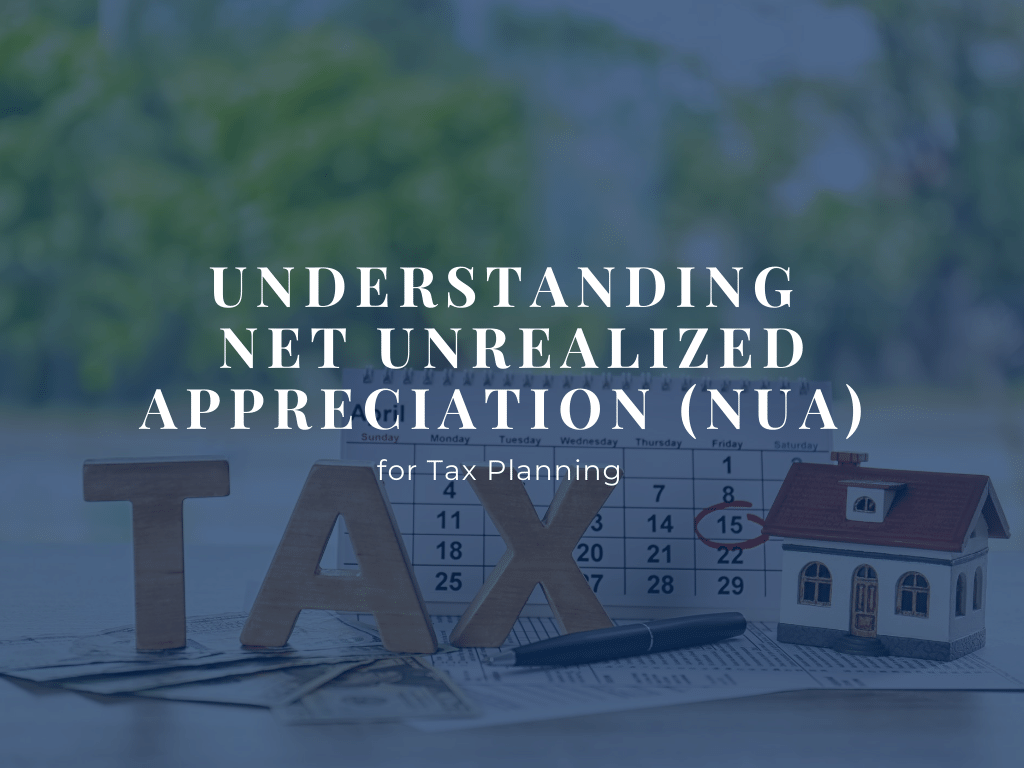
Do you own your employer's publicly traded stock in your qualified retirement plan? And are you planning to retire soon? If yes, then the use of Net Unrealized Appreciation (NUA) may represent a significant tax planning opportunity for you.
It is one that also can reduce the size of your future required minimum distributions and provide more estate planning options. Likely, you have never heard of this tax opportunity. Unless you ask the right questions to the right people, no one may ever bring it up at the time of your retirement.
A mistake that many employees make is automatically rolling employer stock into an IRA when they retire without exploring this alternative. This decision can cost you a lot. It's important to know you may only get one chance to utilize the NUA treatment. Often, you must apply it within a limited time following your retirement date.
What is Net Unrealized Appreciation (NUA)?
Some publicly traded companies offer their employees ownership of the company in the form of stock. The Net Unrealized Appreciation (NUA) is important if you are distributing highly appreciated employer stock from your tax-deferred employer-sponsored retirement plan, such as a 401(k).
Typically, funds withdrawn from a tax-deferred account are treated as ordinary income, which is taxed at a higher rate than long-term capital gains income. Fortunately, the Internal Revenue Service (IRS) offers an election for the NUA of employer stock to be taxed at the more favorable capital gains rate.
NUA is the difference between the value at distribution of the employer stock and the stock's cost basis. The cost basis is the original purchase price paid for the stock within the retirement plan. Assuming the security has increased in value, the difference is NUA.
Example A:
Let's say your retirement plan assets include $500,000 of stock in your employer. Your employer's stock price has appreciated dramatically over the years. The stock was bought over your 25-year career for $50,000.If you simply rolled over your retirement plan into an IRA, the funds would be subject to Required Minimum Distribution (RMD) rules. Here you would incur local, s
tate, and federal income taxes on those future withdrawals. Let's say that the combined total tax rate is 33%. Rolling over your stock to an IRA would net you $335,000 after paying $165,000 in taxes on your employer stock worth $500,000.
Example A using NUA strategy:
Using the NUA strategy, your stock is distributed directly to you. The cost basis of the stock becomes income for the year of the distribution, subject to ordinary income tax. In this case the tax bill is $16,500 (33% of $50,000). You can then sell the shares as needed without regard to the RMD rules and pay capital gains tax as you liquidate shares. The capital gains tax rate is typically much lower than the ordinary income tax rate.
Let's say you have substantial other retirement income and end up paying a 15% capital gain tax rate. Utilizing the NUA strategy yields a total tax bill of $84,000, netting you $416,000 on your employer stock. This scenario is a massive win from a tax perspective!
The NUA treatment also provides gift, charitable, tax and estate planning options.
Any issues with minimizing the risk of holding a significant position in a low-cost basis stock can be addressed with your investment adviser.
This optional way of handling your company stock has existed within the IRS regulations for many years and has not been altered. Future forecast changes in taxes on account of government costs during the COVID-19 pandemic may make exploring this tax treatment in the short-term even more favorable to you.
What are the requirements to do this?
- Your company retirement plan must allow for the NUA distribution of company stock. In all cases, this needs to be verified with the retirement plan administrator. Human Resource Departments are often completely unaware of this option.
- This treatment is only available upon retirement or full-time disability. This treatment only pertains to the company stock held in your plan(s), and the stock must be publicly traded.
- You only get this option once.
- Many retirement plans require this be done within a certain number of days of a qualifying event (retirement or disability).
- You cannot have outstanding any loans from your 401(k) plan at the time of the election.
- When you request this, many retirement plans require that you receive all of your employer shares through the NUA distribution, should you elect that option. All other vested retirement balances with that employer retirement plan would also be required to be rolled over to an IRA at that time or within one tax year.
- The NUA disbursement only pertains to stock shares of your employer’s stock, not shares of other companies you may have purchased in your retirement plan account.
- The NUA distribution works best for company stock that is highly appreciated.
How do I know if Net Unrealized Appreciation (NUA) is right for me?
Several factors need to be considered to know if this option is right for you. Your current and projected tax status, overall investment portfolio and strategy, and your financial goals and plans must be considered. You should also start reviewing this option earlier to help you time your retirement from a tax optimization standpoint.
We advise that you work in collaboration with your tax adviser, financial planning and investment adviser, and a representative of your retirement plan's administrator. Everyone's situation is unique, and it is helpful to see it from all perspectives.
Just as important, you should be sure that the mechanics flow smoothly (who gets notified, when do they get told, is notification verbal or written, where do the funds get transferred to, etc.) In many cases, you only have a set number of days to implement this option, and all of the details must be done correctly to qualify for this treatment.
The NUA tax treatment is more than a bit complicated. It is also something not easily explained in a casual phone conversation, so we would be more than happy to meet with you to discuss this in person.
This was prepared by Carnegie Investment Counsel (“Carnegie”), a federally registered investment adviser under the Investment Advisers Act of 1940. The information herein was obtained from various sources. Carnegie deems the information to be reliable as of the date indicated (or of publication), and the information provided is subject to become out-of-date as tax, securities and other laws change over time. This is prepared for informational purposes only. The opinions presented are subject to change without notice in reaction to shifting market conditions. Past performance is not a guarantee of future results. Carnegie does not provide legal, insurance, or tax services.
Got Questions? Ready to Meet With a Financial Advisor?
Schedule an appointment today to learn more about how Carnegie can help with financial planning and wealth management.



